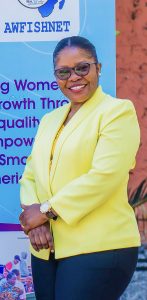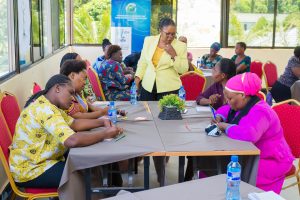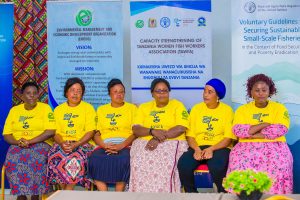Interview with Editrudith Lukanga, Environmental Management and Economic Development Organization (EMEDO), Tanzania
This interview with Edithrudith Lukanga (elukanga@gmail.com), Secretary General of AWFishNet and Technical Advisor at EMEDO, Tanzania was conducted by N. Venugopalan (icsf@icsf.net ), Programme Manager, ICSF
Please share some of your experiences of working with women in the fisheries sector.
 In Tanzania, I founded an organization called Environmental Management and Economic Development Organization (EMEDO). As part of implementing the SSF guidelines, under an FAO-supported project titled “Implementation of the Small-Scale Fisheries Guidelines for gender equitable and climate resilient food systems and livelihoods”, EMEDO implemented a project on the capacity building of women and facilitated a number of consultative workshops in various fifteen districts in Lake Victoria. We learnt a lot of things. Just imagine, in the same district there are fisheries officers and community development officers who are working with the same group of women but don’t communicate with one another. For example, the community development office facilitates loans to women’s groups and individuals operating in the fisheries. When they get loans, women invest back in fisheries. However, being ignorant of the legislation governing the fisheries sector, they may buy fish which are undersized. In this case, if they are caught, the fisheries officer will confiscate all their fish and the women will lose their capital. So, we train them on the regulatory framework governing the fisheries sector to avoid such issues. These consultations have led to the strengthening of the women fish-workers network in the Lake Zone. They elected their leaders to coordinate district and regional processes and have a zonal executive committee. They make personal contributions to organize meetings and have also started a fund to reduce the challenges they face with access to funding.
In Tanzania, I founded an organization called Environmental Management and Economic Development Organization (EMEDO). As part of implementing the SSF guidelines, under an FAO-supported project titled “Implementation of the Small-Scale Fisheries Guidelines for gender equitable and climate resilient food systems and livelihoods”, EMEDO implemented a project on the capacity building of women and facilitated a number of consultative workshops in various fifteen districts in Lake Victoria. We learnt a lot of things. Just imagine, in the same district there are fisheries officers and community development officers who are working with the same group of women but don’t communicate with one another. For example, the community development office facilitates loans to women’s groups and individuals operating in the fisheries. When they get loans, women invest back in fisheries. However, being ignorant of the legislation governing the fisheries sector, they may buy fish which are undersized. In this case, if they are caught, the fisheries officer will confiscate all their fish and the women will lose their capital. So, we train them on the regulatory framework governing the fisheries sector to avoid such issues. These consultations have led to the strengthening of the women fish-workers network in the Lake Zone. They elected their leaders to coordinate district and regional processes and have a zonal executive committee. They make personal contributions to organize meetings and have also started a fund to reduce the challenges they face with access to funding.
Could you also share some examples of women’s organization and mobilization?
The continental network of women in the small-scale fisheries in Africa, AWFishNet, was established in April 2017 with the support of the African Union-Interafrican Bureau for Animal Resources (AU-IBAR), as a platform for women fish processors and traders in the continent. This platform allows for the sharing of experiences: what is working and what is not working and why. It advocates for issues affecting women’s activities and facilitates an enabling environment to enhance their role in the fisheries sector as women. In terms of mobilizing, because AWFishNet encompasses the whole value chain members, its members are national networks of women fishworkers. AWFishNet tries to strengthen the small and medium enterprises women run by fish processors and traders by expanding most of their markets and marketing opportunities.
Immediately after establishing AWFishNet, we developed a plan of action. One action was that representatives when they go back, should work with the line ministries responsible for fisheries in their countries to facilitate establishment of national platforms where they do not exist or to strengthen which are already existing. The Tanzanian process had started even earlier. In 2016 in Tanzania, EMEDO in collaboration with the Ministry responsible for Fisheries, organized a national workshop to raise awareness of the SSF guidelines. This workshop was informed by the study conducted by EMEDO on the role, the place, the challenges and the opportunities of women fish workers in the small-scale fisheries in the Lake Victoria region. One of the main recommendations was to facilitate formation of the national network of women in SSF. This workshop was also a steppingstone to the Ministry’s collaboration with the FAO for the implementation of the SSF guidelines.
The implementation of the SSF guidelines was the focus of a research study conducted in 2018 by EMEDO, coordinated by the Ministry responsible for Fisheries with funding from the FAO. It looked at how women are organized in all the five regions that have water bodies in Tanzania. The outcome of that study informed the establishment of Tanzania Women Fishworkers Association or TAWFA in 2019, which also became a member of AWFishNet. This is the process on the mobilization went. We asked some 200 women’s groups if coming together in a national platform is a good idea. All the group representatives said yes to the idea because women in the fisheries value chain are not recognized, not appreciated and are always the last in everything. Having this national platform will amplify their unified voice and influence. And we are seeing it happening.

How does your work amplify women’s voices?
When women come together in a national platform, it gives them space; it gives them a moment to sit together and share their experiences. In Tanzania, we have the three great lakes, the Indian Ocean, and other small waterbodies, which includes both small lakes and very big rivers. EMEDO has worked closely with the Ministry to structure this national network into sub-chapters. Through the national network, women have been supported with a number of initiatives, including trainings and linkages with various actors. For example, immediately after the platform was launched, EMEDO conducted a training on transformative leadership for the coordination committee members to equip them with skills to perform their national leadership roles. I say with confidence that TAWFA could serve as an example of how to strengthen women’s organizations in the country. We had a meeting with Civil Society Organizations (CSOs) working in the fisheries sector in the country. The Ministry then identified strong CSOs that are working in each waterbody area with the intention of supporting those sub-chapters. Some groups are a bit ahead; some are just starting out; some are in the middle. If there are strong groups with strong sub-chapters, they are able to knock on any door at whatever time they want. These groups are invited to a number of meetings at the national level; they organize their own meetings too with our support; and they often invite high level officials from the ministry to these meetings. As EMEDO, our role was to train women on transformative leadership. The trainings have indeed been very transformative and enabled the confidence that women brought to their leadership roles.
Are the challenges faced by AWFishNet networks similar in the different African countries or quite different?
Generally, I would say the challenges are similar, but they are contextual. There are differences based on the culture and on the type of fishery. The differences are informed by a number of processes as well. These networks together examine their policies to see how best they can influence policies at the African Union level so that these may trickle down in terms of influencing individual countries. For example, in 2020-21, AWFishNet in collaboration with other partners like universities, WorldFish and so on, conducted a study that looked into the impact of Covid-19 on women fish processers and traders in sub-Saharan Africa. As were conducting the study, we could see the diversity when it comes to the challenges, and that is why I am saying they are contextual. However, this study led AWFishNet into designing policy recommendations that were feasible for all member countries.
In your opinion, what positive changes have taken place in the last thirty years or so for women in fisheries?
I would underline and capitalize and make bold one word: ACCESS. The number one issue is access to resources. To be a fish processor or trader, you must have access to fish to process and sell. Culturally, there are some countries where women face certain restrictions, but we are also seeing changes. There are several women in Africa now who are very strong in the sector; they own their fishing vessels; some go to fish themselves. In terms of access to financial resources, we are seeing a massive transformation due to interventions on the ground. In Tanzania, there are support mechanisms in place like the village savings and credit schemes which help women get the seed money they need. There are also initiatives by the Ministry for example, through “the blue economy”; the Ministry is also making some efforts to facilitate capital to women’s groups. In terms of access to information, we are seeing a huge transformation with the use of social media. Information is everywhere. Women are more confident right now. Earlier they would be shy but these days it is different. They’re like: ‘This is my job; this is what feeds me; this is what enables me to take care of my family. So why would I be shy? I am not relying on anybody else to give me food, to take my children to school, to have healthcare for my family!’ But we need to have a mix. When we train women, we share with them strategies that may sometimes work and sometimes may not. For those strategies that work, we need to also support women with financing because if we train and leave, that does not help much.

Is the decision-making around fisheries changing for the better?
Currently, the government is making strides towards recognizing women, and, since the national platforms of women today are strong, the government is including women in various programs and processes. Giving an example from Tanzania, during the review of fisheries law in 2019, in the room where the review of the policy was being launched, I did not see any women processors. When I raised a question about this, they said that women were represented in the room as processors. But I could not see them so I asked then: who are these processers? It turned out that there were men in the room representing the fish processing factories. But you cannot equate women fish processors and traders with processing factory owners – it does not make sense! This is an example of the type of challenges that exist, Later, particularly after TAWFA was established, women began to be invited to participate in the other consultative meetings. After the national network came into being, things became totally different. The network is involved in every aspect of decision making. I see this as a good beginning although we still have a long way to go in terms of real actions on the ground.
Could you describe how and why women are moving away from traditional processing to modern processing facilities?
Moving away from traditional processing facilities to modern processing facilities is a process that involves many factors. Some time back, representatives of women fish processors and traders went on learning missions to Ghana where they learnt about modern facilities. However, implementation is still a challenge due to many reasons including the lack of capital. For example, we have an island called Goziba in the middle of Lake Victoria in the northwestern part of Tanzania and it is huge in terms of fishing activity, mostly silverfish. Judith, a member of the governing body of TAWFA at the national level, is trying hard to mobilize the local women there. There are only three men who own fish drying racks that they rent out. For the women (and other men), if they want to dry their fish, they have to pay for the service. The only other alternative is to spread the fish on the sand. This is what most women are forced to do but it impacts their business because the dried fish is poorer in quality and cannot fetch a very good price. Also, drying fish in the beach is much harder particularly during the rainy season. This is situation in landing sites along the lake as well. However, there are instances in some other landing sites where a few women own the fish drying racks, and it is a huge advantage to them. Other women do wish to build their own drying racks. That transformation is happening but slowly. The chairperson of TAWFA has some land where she has built some drying racks and is currently training other women.
Are there policies or legislation in any African country for post-harvest fisheries alone?
I may not be informed enough but in most countries that I know of, the fisheries policy takes on board everything. Earlier aquaculture was included within fisheries but now fisheries and aquaculture policy in many cases are separate. I believe aquaculture is a different domain that should have its own policy.
Have any African countries adopted gender-sensitive budgeting and schemes exclusively for women who work in post-harvest fisheries?
Having a gender-sensitive fisheries budget is a dream that’s yet to come true. I think more efforts need to be put towards gender-disaggregated data and analysis, because when things are non-disaggregated and blanketed together, many things are forgotten, and then, during implementation, other areas are prioritized; not post-harvest, not support for women.
Are African governments supportive of women’s associations, platforms, cooperatives and community networks?
Women’s platforms are receiving a lot of support, especially with the AWFishNet. Most of the national chapters work closely with the line ministries responsible for fisheries in their countries, and even when they were launched, the ministries were supportive. Sometimes the support is limited due to limited budgeting. I understand that for Malawi, Tanzania and Namibia – countries where a national plan of action is being developed – women are being represented within national task teams, so that’s really significant.
Are strong institutional frameworks and mechanisms in place to support gender mainstreaming?
I believe a number of African countries have gender mainstreaming policies, but not exclusively for fisheries. The Ministry responsible for Fisheries has to make an extra effort to include gender mainstreaming. In Tanzania, there is a gender desk in the Ministry and a gender mainstreaming strategy is in place. It is the implementation part that needs to be operationalized.
What kind of training programmes do women’s organizations working at the national level and especially among the youth, require?
The training programs that they would require are number one, leadership. Once you have good leadership, things move easily. For example, AWFishNet members are national organizations, also referred to as chapters. Every chapter has a board which is formed by representation of women from different parts of that country and that board is diverse because it includes the youth. It is important for the leadership to be trained on leadership skills which involves issues like representation, feedback mechanisms, reporting, financial management training, resource mobilization training, and so on, because establishing a national platform is one thing but making it operational is another. To do so requires several processes, including strategic planning, activity prioritization and resource mobilization.
As far as the youth is concerned, they need trainings on current technologies to simplify their work; on the use of social media for better communication; on networking; and most importantly, on online business skills. They need to be trained on improving the quality of their products and packaging. Consumers these days are more aware and quite careful about the choices they make. And so, processers must present their products in ways that would attract the consumer and build consumer confidence.